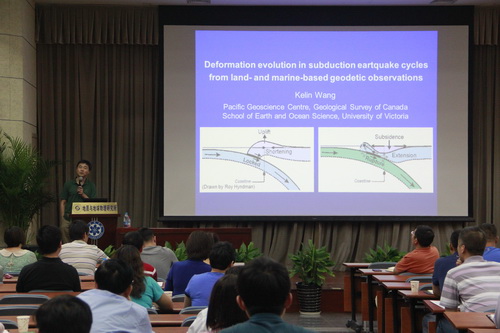Prof. Kelin WANG, who was recently awarded the 2015 J. Tuzo Wilson Medal by the Canadian Geophysical Union, visited the Institute of Geology and Geophysics, Chinese Academy of Sciences (IGGCAS) on 21 May, 2015. Prof. Rixiang Zhu, the Director of IGGCAS, welcomed Prof. Kelin Wang to the Institute.
Prof. Wang gave a lecture titled “Deformation evolution in subduction earthquake cycles from land- and marine-based geodetic observations”. By piecing together land- and marine-based geodetic ‘snapshots’ of co- and post-seismic deformation of of several Mw ≥ 9 earthquakes, Prof. Wang established a deformation cycle associated with subduction earthquakes. After a large subduction earthquake, crustal deformation continues to occur, with a complex pattern of evolution. The postseismic deformation is due primarily to viscoelastic relaxation of stresses induced by the earthquake rupture and continuing slip (afterslip) or relocking of different parts of the fault. He showed unambiguous evidence for the dominant role of viscoelastic relaxation in both short-term and long-term postseismic deformation, rather than traditionally assumed elastic deformation. His report was very well received by the audience of about 100 geoscientists and students from Chinese Academy of Sciences and China Earthquake Administration and generated lively discussion.
Prof. Kelin WANG is a senior Research Scientist in the Pacific Geosicence Centre, Geological Survey of Canada, and is an Adjunct Professor at the University of Victoria. Most of his current research is on geodynamics of subduction zones and related earthquake and tsunami hazards, but he has also worked on arrange of other topics regarding the thermal, mechanical, and hydrogeological processes of Earth’s lithosphere. He has published more than 150 academic papers, including 9 in Nature and Science. He was formerly the Secretary of the Canadian Geophysical Union and Chair of the International Professionals for the Advancement of Chinese Earth Sciences.

Prof. Wang is giving a lecture